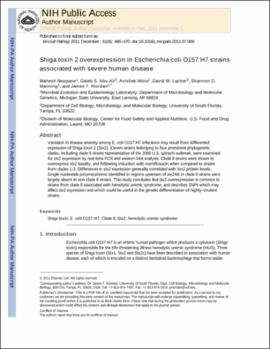| dc.contributor.author | Neupane, Mahesh | |
| dc.contributor.author | Abu-Ali, Galeb S. | |
| dc.contributor.author | Mitra, Avishek | |
| dc.contributor.author | Lacher, David W. | |
| dc.contributor.author | Manning, Shannon D. | |
| dc.contributor.author | Riordan, James T. | |
| dc.date.accessioned | 2023-02-16T16:48:46Z | |
| dc.date.available | 2023-02-16T16:48:46Z | |
| dc.date.issued | 2011-12 | |
| dc.identifier.citation | Neupane, M., Abu-Ali, G. S., Mitra, A., Lacher, D. W., Manning, S. D., Riordan, J. T. (2011). Shiga toxin 2 overexpression in Escherichia coli O157:H7 strains associated with severe human disease. Microbial Pathogenesis, 51(6), pp. 466-470. https://doi.org/10.1016/j.micpath.2011.07.009 | |
| dc.identifier.issn | 0882-4010 | |
| dc.identifier.uri | https://hdl.handle.net/11244/337044 | |
| dc.description.abstract | Variation in disease severity among Escherichia coli O157:H7 infections may result from differential expression of Shiga toxin 2 (Stx2). Eleven strains belonging to four prominent phylogenetic clades, including clade 8 strains representative of the 2006 U.S. spinach outbreak, were examined for stx2 expression by real-time PCR and western blot analysis. Clade 8 strains were shown to overexpress stx2 basally, and following induction with ciprofloxacin when compared to strains from clades 1-3. Differences in stx2 expression generally correlated with Stx2 protein levels. Single-nucleotide polymorphisms identified in regions upstream of stx2AB in clade 8 strains were largely absent in non-clade 8 strains. This study concludes that stx2 overexpression is common to strains from clade 8 associated with hemolytic uremic syndrome, and describes SNPs which may affect stx2 expression and which could be useful in the genetic differentiation of highly-virulent strains. | |
| dc.format | application/pdf | |
| dc.language | eng | |
| dc.publisher | Elsevier | |
| dc.relation.ispartof | Microbial Pathogenesis, 51 (6) | |
| dc.relation.uri | https://www.ncbi.nlm.nih.gov/pubmed/21864671 | |
| dc.relation.uri | http://dx.doi.org/10.1016/j.micpath.2011.07.009 | |
| dc.rights | This material has been previously published. In the Oklahoma State University Library's institutional repository this version is made available through the open access principles and the terms of agreement/consent between the author(s) and the publisher. The permission policy on the use, reproduction or distribution of the material falls under fair use for educational, scholarship, and research purposes. Contact Digital Resources and Discovery Services at lib-dls@okstate.edu or 405-744-9161 for further information. | |
| dc.subject.mesh | Cluster Analysis | |
| dc.subject.mesh | Disease Outbreaks | |
| dc.subject.mesh | Escherichia coli Infections | |
| dc.subject.mesh | Escherichia coli O157 | |
| dc.subject.mesh | Gene Expression | |
| dc.subject.mesh | Hemolytic-Uremic Syndrome | |
| dc.subject.mesh | Humans | |
| dc.subject.mesh | Molecular Typing | |
| dc.subject.mesh | Polymorphism, Single Nucleotide | |
| dc.subject.mesh | Shiga Toxin 2 | |
| dc.subject.mesh | Spinacia oleracea | |
| dc.subject.mesh | United States | |
| dc.subject.mesh | Virulence | |
| dc.title | Shiga toxin 2 overexpression in Escherichia coli O157:H7 strains associated with severe human disease | |
| dc.date.updated | 2023-02-15T23:01:59Z | |
| dc.note | open access status: Green OA | |
| dc.identifier.doi | 10.1016/j.micpath.2011.07.009 | |
| dc.description.department | Microbiology and Molecular Genetics | |
| dc.type.genre | Article | |
| dc.type.material | Text | |
| dc.subject.keywords | Rare Diseases | |
| dc.subject.keywords | Immunization | |
| dc.subject.keywords | Vaccine Related | |
| dc.subject.keywords | Genetics | |
| dc.subject.keywords | Emerging Infectious Diseases | |
| dc.subject.keywords | Kidney Disease | |
| dc.subject.keywords | Biotechnology | |
| dc.subject.keywords | Digestive Diseases | |
| dc.subject.keywords | Infectious Diseases | |
| dc.subject.keywords | Factors relating to the physical environment | |
| dc.subject.keywords | Aetiology | |
| dc.subject.keywords | Infection | |
| dc.subject.keywords | Microbiology | |
| dc.subject.keywords | Immunology | |
| dc.subject.keywords | Medical Microbiology | |
| dc.relation.oaurl | https://pubmed.ncbi.nlm.nih.gov/21864671/ | |
| dc.identifier.author | ORCID: 0000-0003-0243-2045 (Mitra, Avishek) | |
| dc.identifier.essn | 1096-1208 | |
